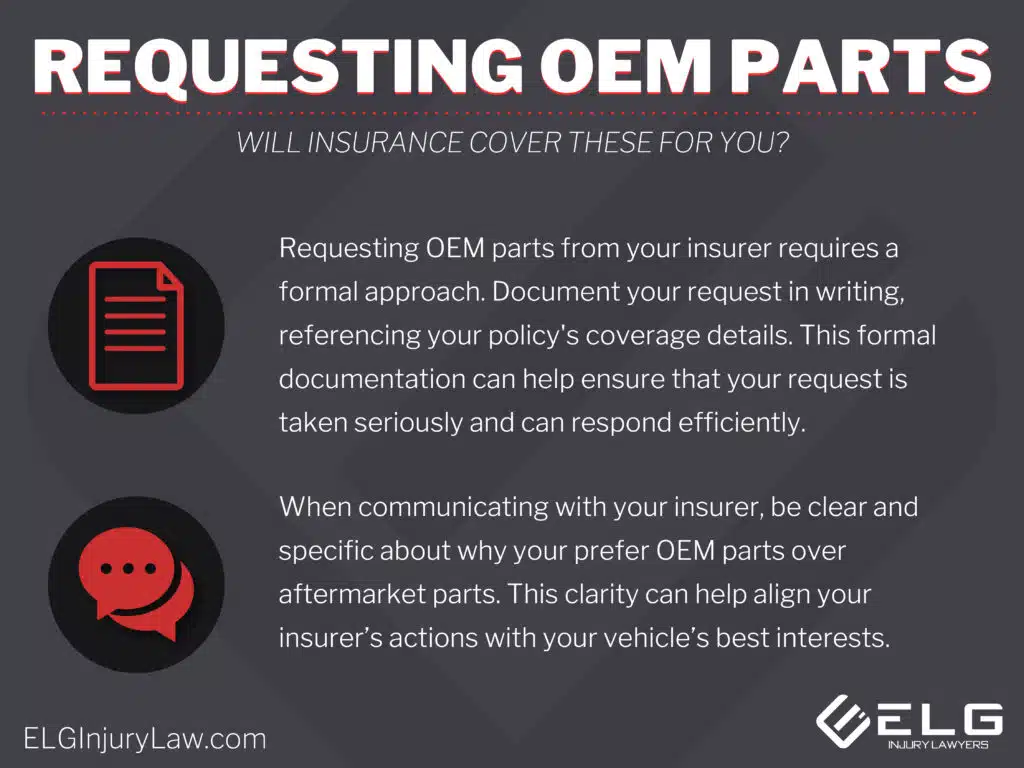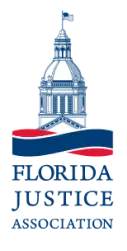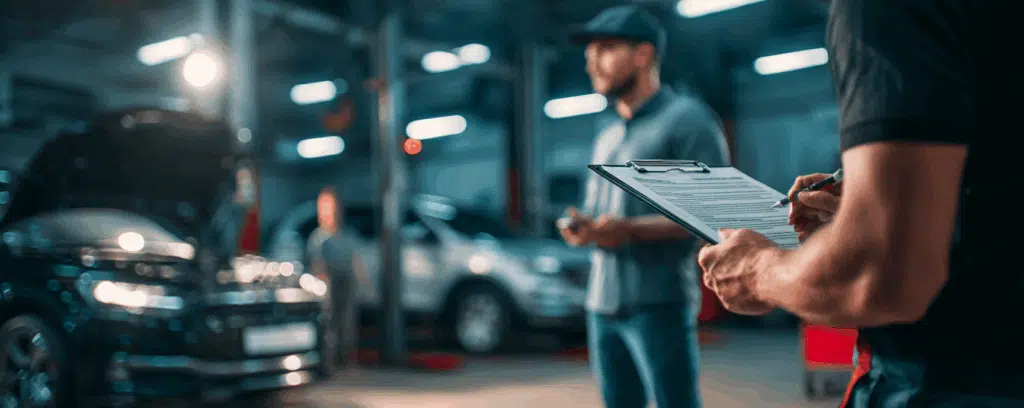
Wondering if you can demand OEM parts after an accident? Yes, you can! However, it depends on several factors, including your insurance policy and state regulations. This article will help you understand your rights regarding “can I demand OEM parts after an accident,” the difference between OEM and aftermarket parts, and how to navigate insurance claims to get the quality repairs your vehicle deserves.
Key Takeaways
- You have the right to choose OEM parts after an accident, but coverage depends on your insurance policy and state regulations.
- Insurance companies may require you to pay the difference if you opt for OEM parts over cheaper aftermarket alternatives, impacting your repair decisions.
- Using aftermarket parts can negatively affect your vehicle’s resale value, safety, and overall performance, making OEM parts a preferable choice for quality repairs.
Understanding OEM Parts vs. Aftermarket Parts
OEM parts are the gold standard in vehicle repairs. These parts are manufactured by the same company that made your vehicle, ensuring they are identical to the original parts in every aspect, from fit to performance. When your car gets repaired with original equipment manufacturer parts, it’s as if it’s being restored to its original factory condition with original equipment manufacturer OEM.
Aftermarket parts come from manufacturers that operate independently. They are not produced by the original equipment manufacturers. While these parts can be significantly cheaper, they often vary in quality and may not meet the exact specifications of OEM parts. This can lead to discrepancies in performance, which might affect your vehicle’s handling and longevity.
The choice between OEM and aftermarket parts doesn’t just boil down to cost and quality. It also impacts your vehicle’s value. Repairs using aftermarket parts can potentially lower your car’s resale value and might even void certain warranties. The Magnuson-Moss Warranty Act, however, protects consumers from losing their warranty simply for using non-OEM parts unless the manufacturer can prove that the aftermarket part caused the damage.
In essence, the difference between these parts can be as stark as night and day. Knowing these differences is the first step in making informed decisions about your car repairs and money.
Your Rights to Demand OEM Parts
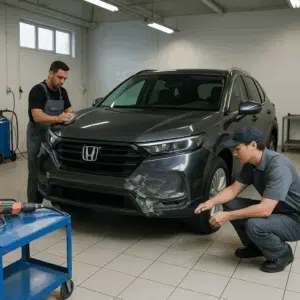
However, it’s important to understand that insurance companies are not always obligated to cover the cost of OEM parts unless it’s stated in your policy. If your insurer is reluctant to approve OEM parts, persistence and thorough documentation of all communications can be your best tools. In some cases, you might need to file an internal appeal or seek external mediation if you’re unhappy with their decision.
Remember, using OEM parts ensures that your vehicle is repaired to the highest quality standards, maintaining its inherent value and security. If you feel strongly about using OEM parts, knowing and asserting your rights can make all the difference.
How Insurance Companies Handle OEM Parts Requests
Insurance companies often have specific procedures for handling OEM parts requests. Keeping detailed records of all repairs and communications with your insurer is essential in supporting your request for OEM parts. These records can be crucial if there’s any dispute over the parts used in the repairs.
In many cases, insurance policies may require you to pay the difference in cost if you opt for OEM parts over non-OEM alternatives. This additional cost can be a significant factor in your decision-making process. It’s also worth noting that using aftermarket parts can potentially void your vehicle’s warranty and lower its fair market value.
Understanding how your insurance company handles these requests can help you better navigate the process and ensure your vehicle gets the quality repairs it deserves.
Let's Settle For More... Get Your FREE Case Review Today.
Let's Settle For More... Get Your FREE Case Review Today.
Checking Your Insurance Policy for OEM Coverage
Reviewing your insurance policy is the first step in determining if you’re covered for OEM parts. Many standard auto insurance policies do not automatically include OEM parts coverage, making it essential to check for optional coverage. This coverage can ensure that your repairs use parts that meet the vehicle’s original specifications, maintaining its integrity and value.
Insurance policies can vary significantly among different insurers, and some might impose limitations based on your vehicle’s age or mileage. It’s crucial to verify these details to avoid any surprises when you need to make a claim.
Identifying Specific Coverage for OEM Parts
To determine if your policy covers OEM parts, follow these steps:
- Contact your insurance provider to inquire about OEM parts coverage.
- Ask about their specific policy on OEM parts.
- Gather any necessary documentation, such as repair estimates from approved shops.
This information can additionally strengthen your case for OEM parts coverage.
It’s also advisable to keep any correspondence with your insurer and repair shops as evidence of your request for OEM parts. Understanding your policy’s limitations and the specific parts covered is crucial before proceeding with repairs.
Impact of Using Aftermarket Parts on Vehicle Value
The use of aftermarket parts can significantly impact your vehicle’s value. While aftermarket parts can be cheaper, their quality can vary, and they may not meet the same specifications as OEM parts. This discrepancy can affect your vehicle’s performance and longevity.
Moreover, certain types of aftermarket parts have several considerations:
- They might not have the same crash ratings as OEM parts, potentially compromising safety.
- Vehicles with various aftermarket enhancements often attract fewer buyers, leading to lower resale prices.
- Certain aftermarket features, particularly aesthetic ones, are not favored by the general market, which typically prefers original factory designs.
Using aftermarket parts can also lead to a decrease in your vehicle’s market appeal and safety perception, making it harder to sell. Overall, the use of non-original parts can result in immediate diminished value and inherent diminished value, both immediately and in the long term.
Negotiating with Your Insurance Company
Negotiating with your insurance company can be a daunting task, but it’s crucial for ensuring quality repairs. Being present during the inspection with the adjuster can prevent misunderstandings and help you convey your preferences clearly. Building a rapport with the adjuster can also lead to more favorable outcomes.
To strengthen your position during negotiations:
- Document all communications and be persistent.
- Know the details of your policy to aid in challenging potential denials of OEM part requests.
- If negotiations become difficult, consult an attorney to help ensure that your safety and the value of your claim are not compromised.
Effective strategies include:
- Providing options to the adjuster.
- Justifying the necessity of OEM parts.
- Expressing your preference for OEM parts.
- Share any concerns about non-original parts to support your case.
Consulting a Car Accident Attorney
If your insurer insists on using non-original parts, consulting a car accident law firm can be beneficial. Attorneys can assist you in:
- Understanding your rights
- Navigating legal complexities
- Filing a claim if needed
- Representing you in cases involving personal injuries and inherent diminished value claims.
Speaking with an accident lawyer before settling a claim can ensure you receive fair compensation for damages in the form of a settlement. Consulting an attorney doesn’t always mean filing a lawsuit; often, it involves prompting reconsideration from the insurer.
Finding a Reliable Body Shop for OEM Repairs
Choosing a reliable body shop for OEM repairs is essential to ensure quality repairs. The reputation of the shop should be a major consideration alongside the cost. Check the certifications and training of technicians for your specific vehicle make and model to ensure they are qualified to perform the repairs.
Obtaining repair estimates from multiple shops in Oregon can help you compare pricing and services. Visiting the shop to check its facilities and equipment can help further assess the quality of access to the body shop and provide an estimate of the overall experience.
Finally, check for warranties offered for repairs to ensure peace of mind regarding the quality of work.
Frequently Asked Questions
Can I insist on OEM parts for my car repairs?
You can insist on OEM parts for your car repairs, but be aware that your insurance policy may affect whether the costs are fully covered. Always check the terms of your policy to understand your options.
Will using aftermarket parts void my car’s warranty?
Using aftermarket parts will not automatically void your car’s warranty; the manufacturer must prove that the part caused any damage for the warranty to be affected. It’s important to be informed about your rights under the Magnuson-Moss Warranty Act.
How can I check if my insurance policy covers OEM parts?
To determine if your insurance policy covers OEM parts, review the policy documents or directly contact your insurer for clarification on any specific clauses related to OEM coverage.
What should I do if my insurer denies my request for OEM parts?
If your insurer denies your request for OEM parts, document all communications and consider filing an internal appeal or seeking external mediation. Persistence is key in this process.
Why should I choose a body shop with OEM certifications?
Choosing a body shop with OEM certifications guarantees that technicians are specifically trained for your vehicle, which helps preserve its quality and integrity during repairs. This approach results in safer and more reliable outcomes for your car.
Related Articles
How Much Does It Cost to Hire a Car Appraiser?
How Much Does an Accident Devalue a Car?
Last updated Thursday, September 4th, 2025
